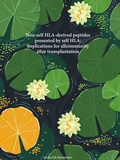Non-self HLA-derived peptides presented by self HLA: implications for alloimmunity after transplantation

Peereboom, Emma
- Promoter:
- Prof.dr F. (Femke) van Wijk
- Co-promoter:
- Dr H.T. (Eric) Spierings
- Research group:
- Spierings , Wijk
- Date:
- October 2, 2025
- Time:
- 12:15 h
Summary
All promotions can be followed live via this link:
https://www.uu.nl/en/organisation/utrecht-university-hall/schedule
HLA matching plays an important role in the success of a kidney transplantation. A mismatch between donor and recipient could lead to alloreactivity, which may result in rejection and even graft failure. In this thesis, we further explore how non-self HLA presented by self HLA may lead to alloimmunity in allogeneic setting, with a focus on kidney transplantation.
In the first part of the thesis, we investigate how donor HLA-derived CD4+ T-cell epitopes are associated with transplant outcome. Such CD4+ T-cell epitopes, consisting of peptides derived from non-self donor HLA presented by HLA class II molecules of the recipient, can be predicted with the PIRCHE-II algorithm. In this thesis, we show that the number of predicted donor HLA-derived CD4+ T-cell epitopes associates with T-cell-mediated rejection after kidney transplantation. We also examined whether a higher potential for CD4+ T-cell memory increases the risk of graft failure in pre-immunized kidney transplant recipients. As a proxy for T-cell memory, we calculated the overlap between immunizing HLA- and donor HLA-derived peptides that can be presented by recipient HLA class II. We observed that pre-immunized recipients with a higher number of such overlapping peptides had a significantly increased risk of developing graft failure after transplantation.
We also investigated CD4+ T-cell alloreactivity in another allogeneic setting, namely pregnancy. We observed that untreated women with secondary recurrent pregnancy loss who gave birth during the study had more predicted paternal HLA-derived CD4+ T-cell epitopes compared to women who experienced another pregnancy loss. In addition, these women had more overlapping peptides between the two paternal haplotypes compared to women who experienced another pregnancy loss, suggesting a protective role for such T-cell epitopes in women experiencing recurrent pregnancy loss.
In the second part of this thesis, we have studied HLA class I leader peptides. As several HLA-A and -C leader peptides are identical to a peptide produced by specific CMV strains, we hypothesized that CMV-seropositive recipients may have generated immunological memory against this peptide, which may be reactivated by this same peptide present in the transplant. We found that CMV-seropositive kidney transplant recipients without such a leader peptide, who are transplanted with a donor with the leader peptide, have an increased risk of developing T-cell-mediated rejection (TCMR) early after transplantation. In addition, we show that that CMV-seropositive kidney transplant recipients with a specific variant of the HLA-B leader peptide also have an increased risk of early TCMR.
Combined, the results presented in this thesis highlight an important role for both CD4+ T-cell epitopes and HLA leader peptides. The results contribute to a better understanding of the immune response against peptides derived from non-self HLA that are presented in self HLA. In the future, the insights from this work may help improve donor organ allocation and enable a more accurate assessment of the risk of rejection after transplantation.